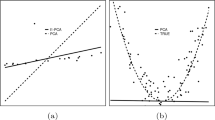Abstract
This contribution discusses one aspect of statistical learning and generalization. The theory of learning is very relevant to cognitive systems including cognitive vision.
A technique allowing to approximate a huge training set is proposed. The approach aims to represent data in a low dimensional space with possibly minimal representation error which is similar to the Principal Component Analysis (PCA). In contrast to the PCA, the basis vectors of the low dimensional space used for data representation are properly selected vectors from the training set and not as their linear combinations. The basis vectors can be selected by a simple algorithm which has low computational requirements and allows on-line processing of huge data sets. As the computations in the proposed algorithm appear in the form of a dot product, kernel methods can be used to cope with non-linear problems.
The proposed method was tested to approximate training sets of the Support Vector Machines and the Kernel Fisher Linear Discriminant which are known methods for learning classifiers. The experiments show that the proposed approximation can significantly reduce the complexity of the found classifiers while retaining their accuracy. On the other hand, the method is not very suitable for denoising.
The authors were supported by the European Union projects ICA 1-CT-2000-70002, IST-2001-32184 ActIPret, by the Czech Ministry of Education under project MSM 212300013, by the Grant Agency of the Czech Republic project 102/03/0440.
Preview
Unable to display preview. Download preview PDF.
Similar content being viewed by others
Author information
Authors and Affiliations
Editor information
Editors and Affiliations
Rights and permissions
Copyright information
© 2006 Springer-Verlag Berlin Heidelberg
About this chapter
Cite this chapter
Franc, V., Hlaváč, V. (2006). Greedy Kernel Principal Component Analysis. In: Christensen, H.I., Nagel, HH. (eds) Cognitive Vision Systems. Lecture Notes in Computer Science, vol 3948. Springer, Berlin, Heidelberg. https://doi.org/10.1007/11414353_7
Download citation
DOI: https://doi.org/10.1007/11414353_7
Publisher Name: Springer, Berlin, Heidelberg
Print ISBN: 978-3-540-33971-7
Online ISBN: 978-3-540-33972-4
eBook Packages: Computer ScienceComputer Science (R0)




